- Home
- Julian Barnes
Flaubert's Parrot Page 2
Flaubert's Parrot Read online
Page 2
The control of tone is vital. Imagine the technical difficulty of writing a story in which a badly stuffed bird with a ridiculous name ends up standing in for one third of the Trinity, and in which the intention is neither satirical, sentimental, nor blasphemous. Imagine further telling such a story from the point of view of an ignorant old woman without making it sound derogatory or coy. But then the aim of Un cœur simple is quite elsewhere: the parrot is a perfect and controlled example of the Flaubertian grotesque.
We can, if we wish (and if we disobey Flaubert), submit the bird to additional interpretation. For instance, there are submerged parallels between the life of the prematurely aged novelist and the maturely aged Félicité. Critics have sent in the ferrets. Both of them were solitary; both of them had lives stained with loss; both of them, though full of grief, were persevering. Those keen to push things further suggest that the incident in which Félicité is struck down by a mail-coach on the road to Honfleur is a submerged reference to Gustave’s first epileptic fit, when he was struck down on the road outside Bourg-Achard. I don’t know. How submerged does a reference have to be before it drowns?
In one cardinal way, of course, Félicité is the complete opposite of Flaubert: she is virtually inarticulate. But you could argue that this is where Loulou comes in. The parrot, the articulate beast, a rare creature that makes human sounds. Not for nothing does Félicité confuse Loulou with the Holy Ghost, the giver of tongues.
Félicité + Loulou = Flaubert? Not exactly; but you could claim that he is present in both of them. Félicité encloses his character; Loulou encloses his voice. You could say that the parrot, representing clever vocalisation without much brain power, was Pure Word. If you were a French academic, you might say that he was un symbole de Logos. Being English, I hasten back to the corporeal: to that svelte, perky creature I had seen at the Hôtel-Dieu. I imagined Loulou sitting on the other side of Flaubert’s desk and staring back at him like some taunting reflection from a funfair mirror. No wonder three weeks of its parodic presence caused irritation. Is the writer much more than a sophisticated parrot?
We should perhaps note at this point the four principal encounters between the novelist and a member of the parrot family. In the 1830s, during their annual holiday at Trouville, the Flaubert household regularly used to visit a retired sea-captain called Pierre Barbey; his ménage, we are told, included a magnificent parrot. In 1845 Gustave was travelling through Antibes, on his way to Italy, when he came across a sick parakeet which merited an entry in his diary; the bird used to perch carefully on the mudguard of its owner’s light cart, and at dinnertime would be brought in and placed on the mantelpiece. The diarist notes the ‘strange love’ clearly evident between man and pet. In 1851, returning from the Orient via Venice, Flaubert heard a parrot in a gilt cage calling out over the Grand Canal its imitation of a gondolier: ‘Fà eh, capo die.’ In 1853 he was again in Trouville; lodging with a pharmacien, he found himself constantly irritated by a parrot which screamed, ‘As-tu déjeuné, Jako?’ and ‘Cocu, mon petit coco.’ It also whistled ‘J’ai du bon tabac.’ Was any of these four birds, in whole or in part, the inspiration behind Loulou? And did Flaubert see another living parrot between 1853 and 1876, when he borrowed a stuffed one from the Museum of Rouen? I leave such matters to the professionals.
I sat on my hotel bed; from a neighbouring room a telephone imitated the cry of other telephones. I thought about the parrot in its alcove barely half a mile away. A cheeky bird, inducing affection, even reverence. What had Flaubert done with it after finishing Un cœur simple? Did he put it away in a cupboard and forget about its irritating existence until he was searching for an extra blanket? And what happened, four years later, when an apoplectic stroke left him dying on his sofa? Did he perhaps imagine, hovering above him, a gigantic parrot – this time not a welcome from the Holy Ghost but a farewell from the Word?
‘I am bothered by my tendency to metaphor, decidedly excessive. I am devoured by comparisons as one is by lice, and I spend my time doing nothing but squashing them.’ Words came easily to Flaubert; but he also saw the underlying inadequacy of the Word. Remember his sad definition from Madame Bovary: ‘Language is like a cracked kettle on which we beat out tunes for bears to dance to, while all the time we long to move the stars to pity.’ So you can take the novelist either way: as a pertinacious and finished stylist; or as one who considered language tragically insufficient. Sartreans prefer the second option: for them Loulou’s inability to do more than repeat at second hand the phrases he hears is an indirect confession of the novelist’s own failure. The parrot/writer feebly accepts language as something received, imitative and inert. Sartre himself rebuked Flaubert for passivity, for belief (or collusion in the belief) that on est parlé – one is spoken.
Did that burst of bubbles announce the gurgling death of another submerged reference? The point at which you suspect too much is being read into a story is when you feel most vulnerable, isolated, and perhaps stupid. Is a critic wrong to read Loulou as a symbol of the Word? Is a reader wrong – worse, sentimental – to think of that parrot at the Hôtel-Dieu as an emblem of the writer’s voice? That’s what I did. Perhaps this makes me as simple-minded as Félicité.
But whether you call it a tale or a text, Un cœur simple echoes on in the brain. Allow me to cite David Hockney, benign if unspecific, in his autobiography: ‘The story really affected me, and I felt it was a subject I could get into and really use.’ In 1974 Mr Hockney produced a pair of etchings: a burlesque version of Félicité’s view of Abroad (a monkey stealing away with a woman over its shoulder), and a tranquil scene of Félicité asleep with Loulou. Perhaps he will do some more in due course.
On my last day in Rouen I drove out to Croisset. Normandy rain was falling, soft and dense. What was formerly a remote village on the banks of the Seine, backdropped by green hills, has now become engulfed by thumping dockland. Pile-drivers echo, gantries hang over you, and the river is thickly commercial. Passing lorries rattle the windows of the inevitable Bar Le Flaubert.
Gustave noted and approved the oriental habit of knocking down the houses of the dead; so perhaps he would have been less hurt than his readers, his pursuers, by the destruction of his own house. The factory for extracting alcohol from damaged wheat was pulled down in its turn; and on the site there now stands, more appropriately, a large paper-mill. All that remains of Flaubert’s residence is a small one-storey pavilion a few hundred yards down the road: a summer house to which the writer would retire when needing even more solitude than usual. It now looks shabby and pointless, but at least it’s something. On the terrace outside, a stump of fluted column, dug up at Carthage, has been erected to commemorate the author of Salammbô. I pushed the gate; an Alsatian began barking, and a white-haired gardienne approached. No white coat for her, but a well-cut blue uniform. As I cranked up my French I remembered the trademark of the Carthaginian interpreters in Salammbô: each, as a symbol of his profession, has a parrot tattooed on his chest. Today the brown wrist of the African boules-phyer wears a Mao transfer.
The pavilion contains a single room, square with a tented ceiling. I was reminded of Félicité’s room: ‘It had the simultaneous air of a chapel and a bazaar.’ Here too were the ironic conjunctions – trivial knick-knack beside solemn relic – of the Flaubertian grotesque. The items on display were so poorly arranged that I frequently had to get down on my knees to squint into the cabinets: the posture of the devout, but also of the junk-shop treasure-hunter.
Félicité found consolation in her assembly of stray objects, united only by their owner’s affection. Flaubert did the same, preserving trivia fragrant with memories. Years after his mother’s death he would still sometimes ask for her old shawl and hat, then sit down with them to dream a little. The visitor to the Croisset pavilion can almost do the same: the exhibits, carelessly laid out, catch your heart at random. Portraits, photographs, a clay bust; pipes, a tobacco jar, a letter opener; a toad-inkwell with a gaping mouth;
the gold Buddha which stood on the writer’s desk and never irritated him; a lock of hair, blonder, naturally, than in the photographs.
Two exhibits in a side cabinet are easy to miss: a small tumbler from which Flaubert took his last drink of water a few moments before he died; and a crumpled pad of white handkerchief with which he mopped his brow in perhaps the last gesture of his life. Such ordinary props, which seemed to forbid wailing and melodrama, made me feel I had been present at the death of a friend. I was almost embarrassed: three days before I had stood unmoved on a beach where close companions had been killed. Perhaps this is the advantage of making friends with those already dead: your feelings towards them never cool.
Then I saw it. Crouched on top of a high cupboard was another parrot. Also bright green. Also, according to both the gardienne and the label on its perch, the very parrot which Flaubert had borrowed from the Museum of Rouen for the writing of Un cœur simple. I asked permission to take the second Loulou down, set him carefully on the corner of a display cabinet, and removed his glass dome.
How do you compare two parrots, one already idealised by memory and metaphor, the other a squawking intruder? My initial response was that the second seemed less authentic than the first, mainly because it had a more benign air. The head was set straighter on the body, and its expression was less irritating than that of the bird at the Hôtel-Dieu. Then I realised the fallacy in this: Flaubert, after all, hadn’t been given a choice of parrots; and even this second one, which looked the calmer company, might well get on your nerves after a couple of weeks.
I mentioned the question of authenticity to the gardienne. She was, understandably, on the side of her own parrot, and confidently discounted the claims of the Hôtel-Dieu. I wondered if somebody knew the answer. I wondered if it mattered to anyone except me, who had rashly invested significance in the first parrot. The writer’s voice – what makes you think it can be located that easily? Such was the rebuke offered by the second parrot. As I stood looking at the possibly inauthentic Loulou, the sun lit up that corner of the room and turned his plumage more sharply yellow. I replaced the bird and thought: I am now older than Flaubert ever was. It seemed a presumptuous thing to be; sad and unmerited.
Is it ever the right time to die? It wasn’t for Flaubert; or for George Sand, who didn’t live to read Un cœur simple. ‘I had begun it solely on account of her, only to please her. She died while I was in the midst of this work. So it is with all our dreams.’ Is it better not to have the dreams, the work, and then the desolation of uncompleted work? Perhaps, like Frédéric and Deslauriers, we should prefer the consolation of non-fulfilment: the planned visit to the brothel, the pleasure of anticipation, and then, years later, not the memory of deeds but the memory of past anticipations? Wouldn’t that keep it all cleaner and less painful?
After I got home the duplicate parrots continued to flutter in my mind: one of them amiable and straightforward, the other cocky and interrogatory. I wrote letters to various academics who might know if either of the parrots had been properly authenticated. I wrote to the French Embassy and to the editor of the Michelin guide-books. I also wrote to Mr Hockney. I told him about my trip and asked if he’d ever been to Rouen; I wondered if he’d had one or other of the parrots in mind when etching his portrait of the sleeping Félicité. If not, then perhaps he in his turn had borrowed a parrot from a museum and used it as a model. I warned him of the dangerous tendency in this species to posthumous parthenogenesis.
I hoped to get my replies quite soon.
2
Chronology
I
1821 Birth of Gustave Flaubert, second son of Achille-Cléophas Flaubert, head surgeon at the Hôtel-Dieu, Rouen, and of Anne-Justine-Caroline Flaubert, née Fleuriot. The family belongs to the successful professional middle class, and owns several properties in the vicinity of Rouen. A stable, enlightened, encouraging and normally ambitious back-ground.
1825 Entry into service with the Flaubert family of Julie, Gustave’s nurse, who remains with them until the writer’s death fifty-five years later. Few servant problems will trouble his life.
c.1830 Meets Ernest Chevalier, his first close friend. A succession of intense, loyal and fertile friendships will sustain Flaubert throughout his life: of particular note are those with Alfred Le Poittevin, Maxime du Camp, Louis Bouilhet and George Sand. Gustave inspires friendship easily, and fosters it with a teasing, affectionate manner.
1831–2 Enters the Collège de Rouen and proves an impressive student, strong in history and literature. His earliest piece of writing to come down to us, an essay on Corneille, dates from 1831. Throughout his adolescence he composes abundantly, both drama and fiction.
1836 Meets Elisa Schlesinger, wife of a German music publisher, in Trouville and conceives an ‘enormous’ passion for her. This passion illuminates the rest of his adolescence. She treats him with great kindness and affection; they remain in touch for the next forty years. Looking back, he is relieved she didn’t return his passion: ‘Happiness is like the pox. Catch it too soon, and it wrecks your constitution.’
c. 1836 Gustave’s sexual initiation with one of his mother’s maids. This is the start of an active and colourful erotic career, veering from brothel to salon, from Cairo bath-house boy to Parisian poetess. In early manhood he is extremely attractive to women and his speed of sexual recuperation is, by his own account, very impressive; but even in later life his courtly manner, intelligence and fame ensure that he is not unattended.
1837 His first published work appears in the Rouen magazine Le Colibri.
1840 Passes his baccalauréat. Travels to the Pyrenees with a family friend, Dr Jules Cloquet. Though often considered an unbudgeable hermit, Flaubert in fact travels extensively: to Italy and Switzerland (1845), Brittany (1847), Egypt, Palestine, Syria, Turkey, Greece and Italy (1849–51), England (1851, 1865, 1866, 1871), Algeria and Tunisia (1858), Germany (1865), Belgium (1871) and Switzerland (1874). Compare the case of his alter ego Louis Bouilhet, who dreamed of China and never got to England.
1843 As a law student in Paris, he meets Victor Hugo.
1844 Gustave’s first epileptic attack puts an end to his legal studies in Paris and confines him to the new family house at Croisset. Abandoning the law, however, causes little pain, and since his confinement brings both the solitude and the stable base needed for a life of writing, the attack proves beneficial in the long run.
1846 Meets Louise Colet, ‘the Muse’, and begins his most celebrated affair: a prolonged, passionate, fighting two-parter (1846–8, 1851–4). Though ill-matched in temperament and incompatible in aesthetics, Gustave and Louise nevertheless last together far longer than most would have predicted. Should we regret the end of their affair? Only because it means the end of Gustave’s resplendent letters to her.
1851–7 The writing, publication, trial and triumphant acquittal of Madame Bovary. A succès de scandale, praised by authors as diverse as Lamartine, Sainte-Beuve and Baudelaire. In 1846, doubting his ability ever to write anything worth publishing, Gustave had announced, ‘If I do make an appearance, one day, it will be in full armour.’ Now his breastplate dazzles and his lance is everywhere. The curé of Canteleu, the next village to Croisset, forbids his parishioners to read the novel. After 1857, literary success leads naturally to social success: Flaubert is seen more in Paris. He meets the Goncourts, Renan, Gautier, Baudelaire and Sainte-Beuve. In 1862 the series of literary dinners at Magny’s are instituted: Flaubert is a regular from December of that year.
1862 Publication of Salammbô. Succès fou. Sainte-Beuve writes to Matthew Arnold: ‘Salammbô is our great event!’ The novel provides the theme for several costume balls in Paris. It even provides the name for a new brand of petit four.
1863 Flaubert begins to frequent the salon of Princesse Mathilde, niece of Napoleon I. The bear of Croisset eases into the pelt of the social lion. He himself receives on Sunday afternoons. The year also contains his first exchange of letters with George Sand,
and his meeting with Turgenev. His friendship with the Russian novelist marks the beginning of a wider European fame.
1864 Presentation to the Emperor Napoleon III at Compiègne. The peak of Gustave’s social success. He sends camellias to the Empress.
1866 Created chevalier de la Légion d’honneur.
1869 Publication of L’Education sentimentale: Flaubert always claims it as a chef-d’œuvre. Despite the legend of heroic struggle (which he himself initiates), writing comes easily to Flaubert. He complains a lot, but such complaints are always couched in letters of astonishing fluency. For a quarter of a century he produces one large, solid book, requiring considerable research, every five to seven years. He might agonise over the word, the phrase, the assonance, but he never endures a writer’s block.
1874 Publication of La Tentation de saint Antoine. Despite its strangeness, a gratifying commercial success.
1877 Publication of Trois Contes. A critical and popular success: for the first time Flaubert receives a favourable review from Le Figaro; the book goes through five editions in three years. Flaubert begins work on Bouvard et Pécuchet. During these final years, his pre-eminence among French novelists is admitted by the next generation. He is fêted and revered. His Sunday afternoons become famous events in literary society; Henry James calls on the Master. In 1879 Gustave’s friends institute the annual Saint Polycarpe dinners in his honour. In 1880 the five co-authors of Les Soirées de Médan, including Zola and Maupassant, present him with an inscribed copy: the gift can be seen as a symbolic salute to Realism from Naturalism.

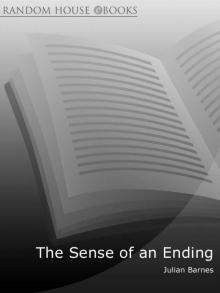 The Sense of an Ending
The Sense of an Ending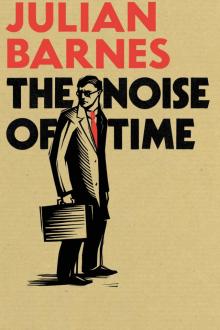 The Noise of Time
The Noise of Time Metroland
Metroland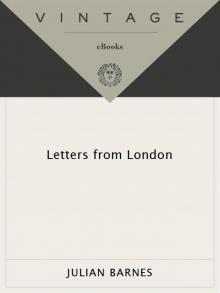 Letters From London
Letters From London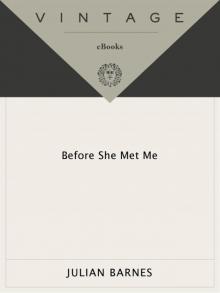 Before She Met Me
Before She Met Me Pulse
Pulse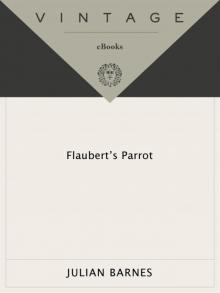 Flaubert's Parrot
Flaubert's Parrot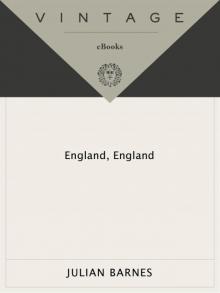 England, England
England, England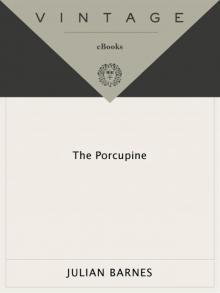 The Porcupine
The Porcupine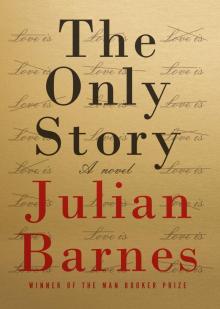 The Only Story
The Only Story Love, Etc
Love, Etc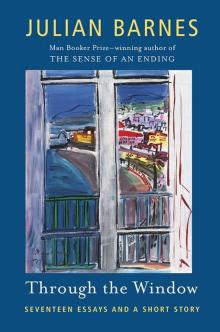 Through the Window: Seventeen Essays and a Short Story
Through the Window: Seventeen Essays and a Short Story Staring at the Sun
Staring at the Sun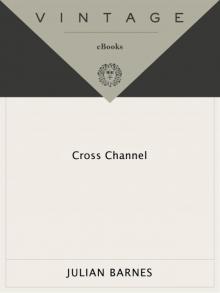 Cross Channel
Cross Channel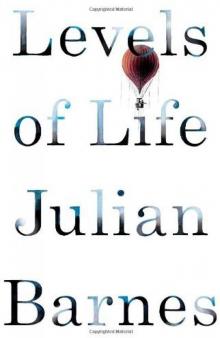 Levels of Life
Levels of Life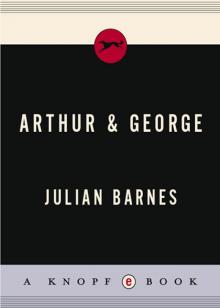 Arthur & George
Arthur & George Love, Etc.
Love, Etc.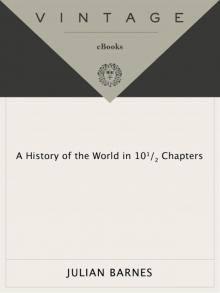 A History of the World in 10 1/2 Chapters
A History of the World in 10 1/2 Chapters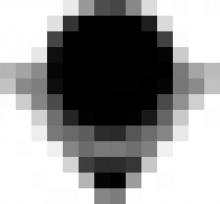 Something to Declare
Something to Declare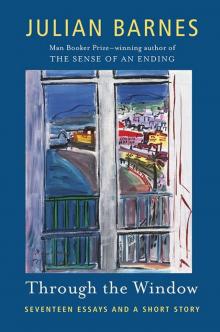 Through the Window: Seventeen Essays and a Short Story (Vintage International)
Through the Window: Seventeen Essays and a Short Story (Vintage International)